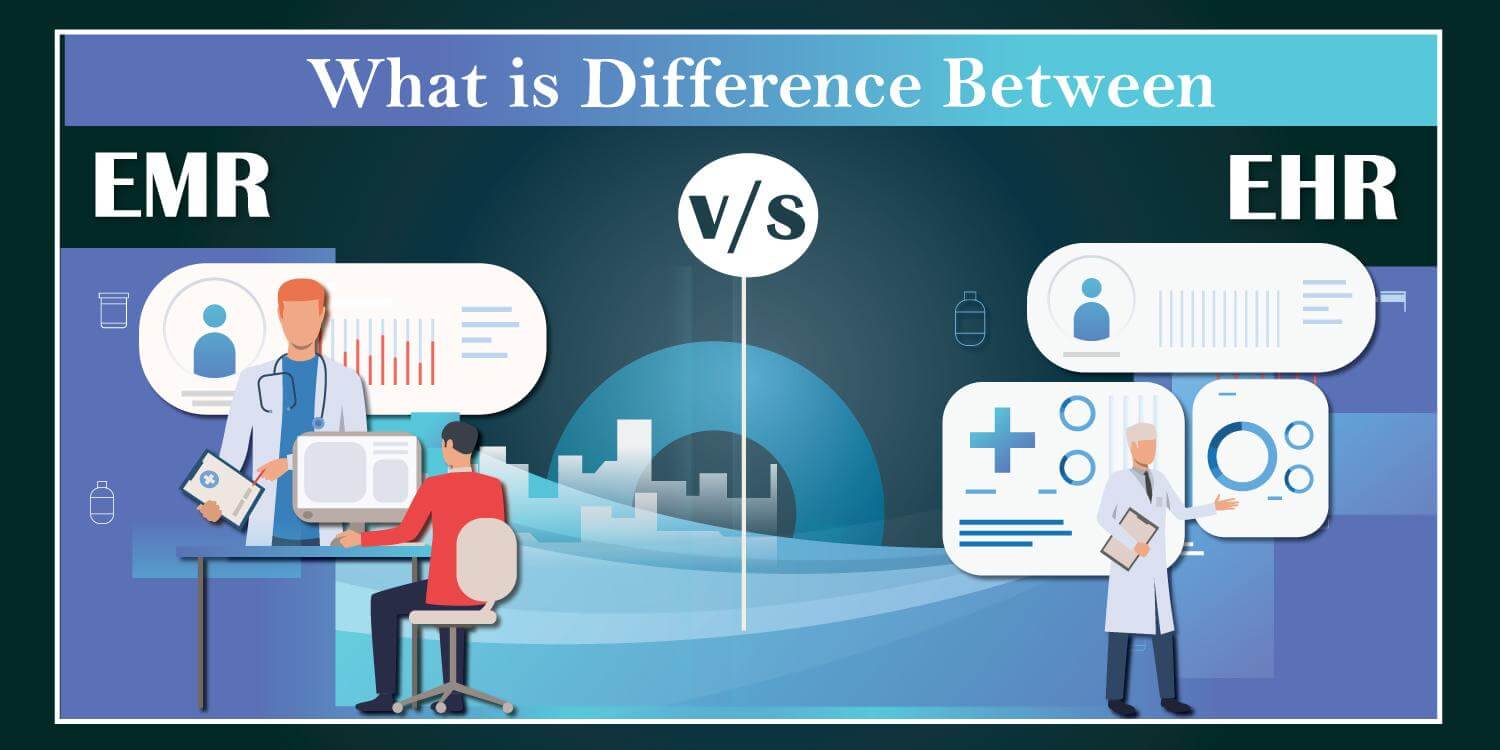What is the Difference between EMR vs EHR
The healthcare industry has experienced a revolution in recent years, especially after the covid-19. Since the healthcare industry is digitalized, Telemedicine software and health records are essential tools for doctors and health specialists. The global electronic health records market is expected to reach a valuation of over $40 billion by the end of 2024. At times, the terms “EHR vs EMR” are used interchangeably. However, both are different from one another. Understanding the difference between EHR and EMR is vital for patients, healthcare providers, and specialists. If you’re eager to know how EMR vs EHR, you’ve landed on the right page. Here we go!
Understanding the difference between EMRs and EHRs is important for healthcare providers, patients, and anyone interested in the digital transformation of the healthcare industry. In this blog post, we’ll explore the key differences between EMRs and EHRs and why they matter..
Table of Contents
- What is an EMR?
- Key Features of EMR
- What is an EHR?
- Key Features of EHR
- What is the difference between EHR and EMR?
- Trends of EHR vs EMR:
- Advantages of EHR
- Disadvantages of EHR
- Advantages of EMR
- Disadvantages of EMR
- How to Choose From EHR vs EMR Technology?
- How Expensive is EHR & EMR Technology for Healthcare Providers?
- Future of Healthcare Records: EHRs as the Preferred Choice
- Commonly Asked Questions (FAQs)
- Summing Up
What is an EMR?
Electronic Medical Records abbreviated as EMR meaning medical are electronic versions of the documents or charts placed in the physician’s clinic. The data are not shared outside the clinic premises. These are mainly utilized for the diagnosis and treatment of the patient’s care.
It may include paper records, medical conditions like medical records, diagnoses, medications, allergies, immunization dates, etc. The treatment aspect is quite inappropriate somewhere as the data doesn’t easily go off the practice place. In some cases, the PHI has to be printed or mailed to the respective authority for treatment.
- It traces data over time
- It can easily track which patients are still due for preventive screening & routine checkups.
- The reports can explain, how well a patient’s data is going on the prescribed treatment.
- It facilitates all the cure and diagnosis parameters.
Key Features of EMR
1. Communication: With the help of EMR software, it becomes easier for doctors to communicate effectively and share important information, such as medical notes, summaries, and ready-to-use templates, faster and more accurately.
2. E-prescription: EMR software allows doctors to share prescriptions digitally with pharmacies and other healthcare providers. It helps to reduce the chances of errors and costly mistakes.
3. Patient Portal: EMR software offers a patient portal where doctors and patients can easily access the information and make communication more transparent.
4. Integrates with Laboratory Processes: EMR software will make sure that there’s no need to handle the lab results manually by integrating EMR software quickly with the lab systems to save time and reduce hassle.
5. Patient History: EMR software keeps complete records of a patient’s medical background, which includes other health issues, current medications, and past treatments. All these details are safely stored.
6. Billing: EMR systems are also connected with billing systems, which make it easier to bill patients accurately for the medical services they receive.
What is an EHR?
EHR first stands for Electronic Health Record mechanism. This is also an electronic way of representing the patient’s information, other details, etc. to the respective person. The information is generally in the form of snapshots. It holds many great benefits that are discussed below:
- It simplifies the sharing of updated & real-time information.
- Helpful in decision-making and offering authentic treatment.
- This gives a detailed account of the patient’s medical histories condition like allergies and radiology images to the concerned lab result.
The technology also provides a patient portal that enables improved patient care to enter their medical conditions from any corner of the world. Telemedicine solution for patients allows doctors to gain access to PHI in the emergency rooms. These were the definition of EMR & EHR terminology. Now comes the differentiation between the two. Read all the details with full concentration.
Key Features of EHR
1. Efficient Tasks Management: EHR systems make it simple to assign tasks to the right person and keep things moving smoothly without any delays.
2. Easy-to-schedule Appointments: Patients can easily book appointments at a time convenient for them with the help of the EHR system, and they don’t need to wait in a long queue at the hospital or clinic anymore.
3. 24/7 Access: EHR systems will make sure doctors and staff can easily access patients’ data anytime to provide care 24/7.
4. Generates Reports: EHR can also create helpful reports to improve patient experience by identifying areas for improvement.
5. Interoperability: EHR has the capability to share patients’ data with other healthcare systems smoothly, which helps doctors and providers work together to care for patients across different locations.
6. Population Health Management: EHR can also analyze health data to help identify new trends and improve health outcomes for communities.
What is the difference between EHR and EMR?
After reading the definition and benefits of Electronic Medical Records and Electronic Health Records, here comes a quick differentiation. This is taken from the information presented above and deals with EHR vs EMR:
| EMR (Electronic Medical Record) | Electronic Health Record (EHR) |
| This is the digital version form of chart or health graphs | This is the electronic version of health information |
| This is not accessible outside the individual premises | It caters to the need of sharing updated & real-time information |
| The patient’s record is complex to move further | Helps in moving the PHI easily |
| This is used by providers for diagnosis and treatment | Providers can get access to the tool for decision making |
Trends of EHR vs EMR:
EHR and EMR are widely used terms. The concept of EHR is now more frequently observed. This is because authorities like the Centers for Medicare & Medicaid Services (CMS), and the Office of the National Coordinator for Health Information (ONC) utilize these terms more promptly.
When we express the term “Medical Reports” it means some sort of clinical data documentation of diagnosis and treatment. But when we express the term “Health Records” it means we are speaking of health and medical conditions.
Since 2014, Black Book Ranking has shown around 31% of practices have adopted an EHR. Electronic Medical Records are not that defining and hence EHR is what people prefer more over EMR technology.
Here are some key trends of EHR vs. EMR:
- Here are some key trends of EHR vs. EMR: Electronic Medical Records (EMRs) were the primary digital medical record used in the early years of healthcare digitization.
- However, Electronic Health Records (EHRs) are becoming more prevalent due to their ability to provide more comprehensive, interoperable data.
- EHRs offer a complete view of a patient’s medical history and can be easily shared among healthcare providers, resulting in better continuity of care.
- There is a growing trend towards patient engagement and empowerment, which EHRs can facilitate through features such as patient portals.
- EHRs are increasingly used to support population health management initiatives by providing data analytics and insights to healthcare providers and policymakers.
- The adoption of EHRs has been partly driven by government initiatives such as the HITECH Act, which provided financial incentives to healthcare providers to implement EHRs.
Advantages of EHR
Here are the advantages of EHR:
1. Improves quality of care
You get easy and quick access to patients’ personal and health information through the EHR systems. It gives doctors a detailed idea about patients’ health conditions. It allows them to make informed medical decisions. According to a report, more than 45% of patients revealed that EHR systems in healthcare have improved the quality of care.
2. Increases efficiency
EHR systems in healthcare significantly improve organizational efficiency. Besides this, there is evidence stating that EHR promotes a positive ROI. EHR systems streamlined major administrative processes, including appointment scheduling, billing, and patient communication.
3. Improves patient engagement
EHR systems build a collaborative environment among specialists, doctors, and patients. It also establishes transparency for patients; as a result, patients can securely share their personal information and engage with health experts.
4. Reduces medical errors
Errors in the healthcare industry are common. Since patients have easy access to their allergies, medical history, and existing medications, it minimizes the chances of conflicts and errors. This ensures that doctors make better recommendations, ultimately improving patients’ health quickly. According to a report, medical errors cost $20 billion annually. By implementing EHR systems, the cost can be reduced.
Disadvantages of EHR
Here are the disadvantages of EHR:
1. Privacy concern
Privacy concerns, such as data breaches, exist while using EHR systems in the healthcare industry. Since the patient’s personal data is updated on the EHR systems, the chances of information leakage exist. This increases privacy concerns.
2. Technical problems
EHR systems are a tech solution; therefore, they are prone to downtime and multiple technical problems. If you are not tech-savvy, using it can be a task.
Advantages of EMR
Here are the advantages of EMR:
1. Enhanced patient care
Other than paper records, EMR systems allow healthcare providers to examine patients’ information in different ways. This enhances the overall patient experience and promotes positive health outcomes. The system also bridges the gap between patients and doctors, establishing a solid relationship.
2. Data security
EMRs feature in-built security systems designed to safeguard medical data from unauthorized access. This reduces the chances of data breaches and malware activities.
3. Better communication
EMRs promote secure online appointment scheduling and messaging, ultimately improving the communication between doctors and patients. This also reduces the wait time, saves money, and improves the overall patient experience.
4. Financial benefits
EMRs also provide financial benefits as these systems save money and time by allowing health experts to access your medical records quickly. Patients can also manage their personal health effectively as it gives them access to their health information.
Disadvantages of EMR
Here are the disadvantages of EMR:
1. Data loss
In the case of EMR systems, the chances of data loss exist. Since the information is saved online, technical glitches can occur. In case there is no data backup, it leads to loss of data. Therefore, you must choose renowned telemedicine startups.
2. Vulnerable to cyber attacks
Another major disadvantage of EMR systems is exposure to unauthorized virtual doctor software and data breaches. Cybercriminals can attack your data and demand patients to restore information. As a result, health experts become victims. Such security breaches also hamper overall reputation and affect the safety and security of your patient.
How to Choose From EHR vs EMR Technology?
The selection of the healthcare software is more like the process of choosing the other IT-evidence Based software. This is the same confusing and time-consuming process. With so many healthcare software development companies, it becomes much more confusing.
Hence, narrow downing the research part may help you a lot. But How? Well, you can obtain feedback, suggestions, etc. from the person utilizing the EHR & EMR suits for a very long. Moreover, you need to consider the requirements of your business before settling up a facility. So considering these aspects, your business would need Electronic Health Record (EHR) solutions.
The next side of the coin says, If your business is focused on a particular matrix and health data do not travel outside the premises then the EMR version is the best thought. Many businesses utilize these terms on interchangeable patterns. Therefore, consider your business aspect first and then implement these prominent technologies.
How Expensive is EHR & EMR Technology for Healthcare Providers?
The setting of this software generally gives a headshot to the pocket. The very first step is to configure the software properly. After this, you have to estimate the direct and indirect expenses.
The clinics with multi-physician capacities will end up to $1,62,000 to implement an EHR or EMR. The first maintenance cost will come to around $85,000. The software then is expected the cost invested within 2.5 years of span. It will then provide a benefit of $23000 per year.
So this is the overall details on the cost incurred in implementing the Electronic Medical & Health Record facility at the healthcare center. While choosing the telehealth services platform, rely on professional advice for the best results.
Future of Healthcare Records: EHRs as the Preferred Choice
When it comes to healthcare records management, EHR is the go-to choice for healthcare organizations. It helps to improve patient care, communication, and data sharing, making it much easier and faster. EHR is easily aligned with the healthcare industry’s goals for better care and managing community health. However, switching from EMR to EHR isn’t easy and requires careful planning to make it happen
Are You Planning to Build a HIPAA Compliant Telemedicine Software?
Commonly Asked Questions (FAQs)
1. Do healthcare centers use EHRs and EMRs?
Based on their specific requirements, hospitals all around the world either use EMR or EHR. Although both have different features, these are designed and developed in digital format for managing patients’ health data.
2. Are EHRs expensive?
Yes, implementing EHR is expensive. Besides the cost of designing and developing these systems, the implementation and maintenance costs are involved.
3. How is EMR different from EHR?
EMR systems are the digital version of the healthcare paper charts. EHR systems contain a variety of data like lab results.
4. Mention common disadvantages of using EMRs
The major disadvantages of using EMRs are:
- It cannot be transferred easily through practice.
- Implementing EMR is costly.
- You need to be tech-savvy to use EMR.
- Spending time learning EMR operations means not giving enough time to your patients.
5. What are some of the best tips to implement EHR and EMR systems successfully?
Here are some of the best tips for implementing EHR and EMR systems:
- You must choose the right setting partner.
- Listen to your teammates before making decisions.
- Prioritize change management efforts.
- Remember, optimization and automation are different.
Summing Up
EHR and EMR systems in hospitals have become the newest trend. These systems are designed to save a lot of your time and money. Although both these seem similar, they have various differences that set them apart. This article discussed the difference between EHR and EMR in detail.
A user or healthcare provider who is seeking to set up one of the two can find these details beneficial. VCDoctor has a list of perfect solutions for you. We help healthcare providers in unleashing their full capacity to treat patients’ information through telemedicine by delivering them sophisticated telemedicine solutions. Feel free to get in touch with our experts to know more about Telehealth Vs Telemedicine and more.





I am really enjoying the theme/design of your blog. Well explained the difference between EMR and EHR.
First of all, thanks for sharing such kind of informative post. I want to appreciate this blog’s UI and the team who has done this hard work to provide us with great information on EMR and EHR.
Thanks for sharing this difference. It helped me to understand the major differences between EMR and EHR.
Hey there! I know you guys worked hard for such kind of informative post. I really appreciate your hard work.
We are a gaggle of volunteers and starting a brand new scheme in our community.
Your site provided us with useful info to work on. You’ve performed a formidable job and
our whole group shall be thankful to you.
Fabulous comparison of EMR vs EHR. Learnt a lot about EMR and EHR. Great and amazing post.
Well explained the difference between EMR and EHR.
I liked the way of explanation the difference between EMR vs EHR. Really amazing post.
Impressive information and easy to understand the difference between EMR & EHR. I read some blog posts and found them very informative with depth information and written in easy language.
Well structure post that define accurate information about the difference between EMR vs EHR. Thanks for sharing this blog.
This is a topic which is near to my heart… Many
thanks!
It has pretty much the best layout and design. Excellent choice of colors! The information provided in this post is excellent.
Hey there, I really like your blog! I can totally relate to your point as I work as a virtual nurse for a BPO provider.